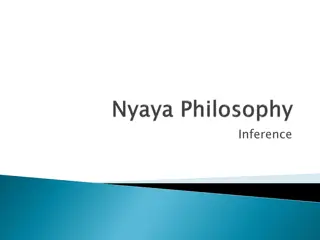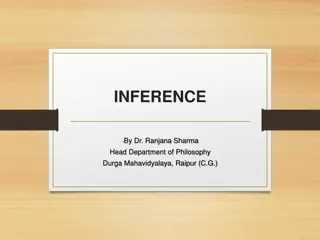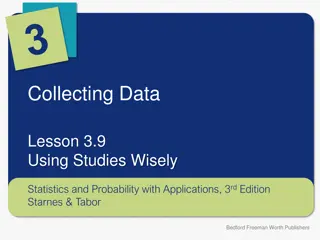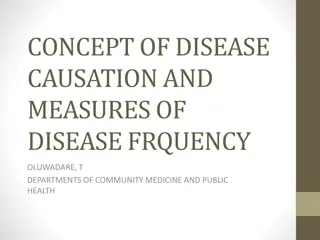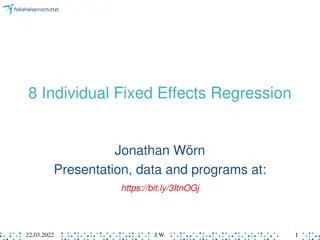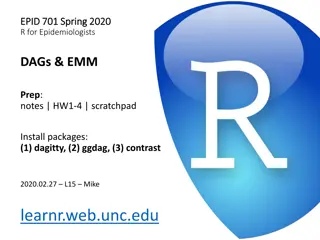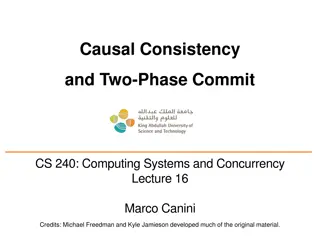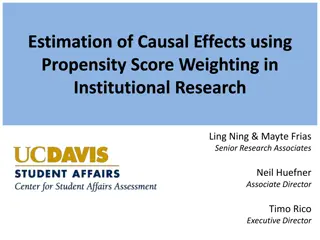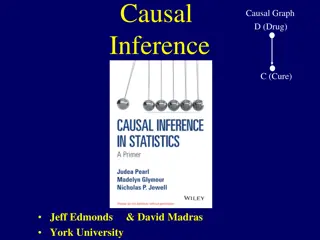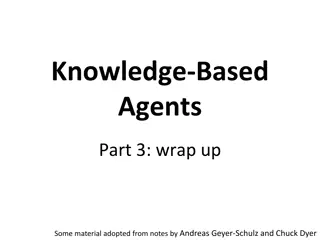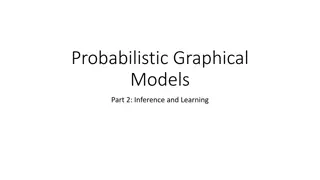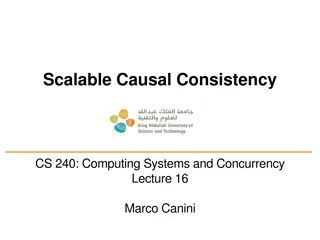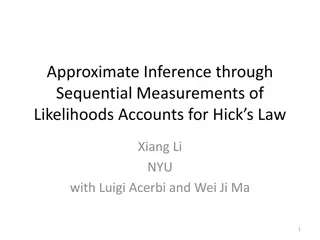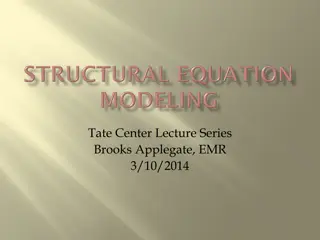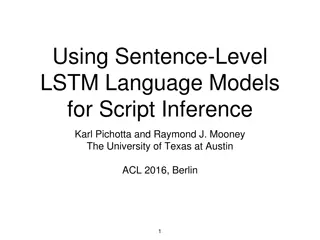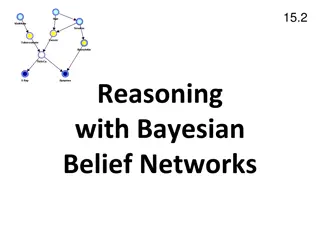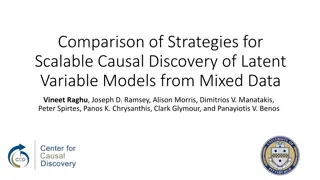Inference and Vyapti in Logic
Inference, known as Anumana in Sanskrit, is the process of deriving knowledge based on existing information or observations. It can be used for personal understanding or to demonstrate truths to others. An inference may be SvArtha (for oneself) or ParArtha (for others). Vyapti, the invariable concom
2 views • 14 slides
Inference in Indian Philosophy
In Indian philosophy, inference is considered one of the six ways to attain true knowledge. It involves three constituents: Hetu (middle term), Sadhya (major term), and Paksha (minor term). The steps of inference include apprehension of the middle term, recollection of the relation between middle an
13 views • 8 slides
Scope of Inference in Statistical Studies
Statistical studies require careful consideration of the scope of inference to draw valid conclusions. Researchers need to determine if the study design allows generalization to the population or establishes cause and effect relationships. For example, a study on the effects of cartoons on children'
2 views • 15 slides
DNN Inference Optimization Challenge Overview
The DNN Inference Optimization Challenge, organized by Liya Yuan from ZTE, focuses on optimizing deep neural network (DNN) models for efficient inference on-device, at the edge, and in the cloud. The challenge addresses the need for high accuracy while minimizing data center consumption and inferenc
7 views • 13 slides
Disease Causation and Frequency Measures
The concept of disease causation delves into the factors that play a role in the development of diseases, emphasizing the importance of studying causation for prevention, control, and treatment. To infer causation, certain conditions must be met, and a causal relationship is characterized by associa
3 views • 47 slides
Fixed Effects Regression for Causal Inference in Social Research
Explore the concept of fixed effects regression for obtaining causal estimates with observational data, focusing on the association between social participation and depressive symptoms. Discover how this method controls for time-invariant factors and eliminates confounding variables, providing a clo
2 views • 49 slides
Directed Acyclic Graphs (DAGs) for Causal Inference
Directed Acyclic Graphs (DAGs) play a crucial role in documenting causal assumptions and guiding variable selection in epidemiological models. They inform us about causal relationships between variables and help answer complex questions related to causality. DAGs must meet specific requirements like
1 views • 63 slides
Causal Consistency in Distributed Systems
This content covers the concept of causal consistency in computing systems, exploring consistency models such as Causal Linearizability and Eventual Sequential. It explains the importance of logical clocks like Lamport and vector clocks, and how they ensure order in distributed systems. The concept
1 views • 35 slides
Estimation of Causal Effects using Propensity Score Weighting
Understanding causal effects through methods like propensity score weighting is crucial in institutional research. This approach helps in estimating the impact of various interventions, such as a writing program, by distinguishing causation from correlation. The use of propensity score matching aids
3 views • 22 slides
Causal Inference and Causal Graphs in Drug Efficacy Studies
This content delves into the concept of causal inference using causal graphs, specifically focusing on the relationship between a drug (D) and its effectiveness in curing a condition (C). It discusses the importance of distinguishing correlation from causation and explores scenarios where confoundin
1 views • 66 slides
Enhancements in Causal Forecasting: SPM 11.0.1/11.1 Overview
Key enhancements in SPM 11.0.1/11.1 focus on improving forecast accuracy through variable history slices, causal forecasting for multiple streams, multi-threading capabilities, easy access to product rollout and causal value pages, and more. The Next Gen Causal Forecasting introduces additional feat
0 views • 6 slides
Knowledge-Based Agents: Inference, Soundness, and Completeness
Inference, soundness, and completeness are crucial concepts in knowledge-based agents. First-order logic allows for expressive statements and has sound and complete inference procedures. Soundness ensures derived sentences are true, while completeness guarantees all entailed sentences are derived. A
4 views • 6 slides
Probabilistic Graphical Models Part 2: Inference and Learning
This segment delves into various types of inferences in probabilistic graphical models, including marginal inference, posterior inference, and maximum a posteriori inference. It also covers methods like variable elimination, belief propagation, and junction tree for exact inference, along with appro
1 views • 33 slides
Causal Inference Models and Data-Driven Methods
Delve into various examples of causal inference models and data analysis methods, from traditional statistical models to cutting-edge data-driven approaches like AI/ML. Understand the challenges of causality interpretation and explore the trade-offs between data size, prediction, and causality in di
2 views • 9 slides
Causal Consistency in Computing Systems
Explore the concept of Causal Consistency in Computing Systems, covering topics such as consistency hierarchy, Causal+ Consistency, relationships in causal consistency, practical examples, and its implementation within replication systems. Learn how it ensures partial ordering of operations and conv
15 views • 31 slides
Sequential Approximate Inference with Limited Resolution Measurements
Delve into the world of sequential approximate inference through sequential measurements of likelihoods, accounting for Hick's Law. Explore optimal inference strategies implemented by Bayes rule and tackle the challenges of limited resolution measurements. Discover the central question of refining a
2 views • 29 slides
Methods for Quantifying Efficacy-Effectiveness Gap in Randomized Controlled Trials
This research discusses the quantification of the efficacy-effectiveness gap in randomized controlled trials (RCTs), particularly focusing on examples in Acute Respiratory Distress Syndrome (ARDS). It explores the challenges of RCTs, ethical considerations, and the use of observational data for caus
0 views • 8 slides
Overview of DAGs in Causal Inference
Understanding Directed Acyclic Graphs (DAGs) in causal inference is crucial for guiding research questions and analyzing causal relationships. This overview covers the basics of DAGs, their requirements, and applications in analyzing causal assumptions. Dive into the world of DAGs to enhance your re
0 views • 28 slides
Latent Variable Modeling in Statistical Analysis
Latent Variable Modeling, including Factor Analysis and Path Analysis, plays a crucial role in statistical analysis to uncover hidden relationships and causal effects among observed variables. This method involves exploring covariances, partitioning variances, and estimating causal versus non-causal
3 views • 59 slides
Evolution of Universes in Causal Set Cosmology Analysis
Causal sets propose a discrete and dynamical spacetime structure, where spacetime elements, called spacetime atoms, evolve through stochastic dynamics. This growth process governs the passage of time, manifesting as accretion or birth of new elements. Classical Sequential Growth Models offer a frame
9 views • 17 slides
Causal Inference in Data Journalism
Delve into the world of data journalism as it explores the causal relationship between museum visits and longevity. Discover the theory of selection, randomized controlled trials, and the nuances of causal claims. Uncover the ambiguity in causal-associational relationships and the idealized RCT appr
2 views • 14 slides
Deriving Causal Inference from Nature
Uncover the nuances of causal relationships through experiments focusing on barnacles, substrate types, and potential outcomes. Explore the depth of mechanistic understanding and address confounding factors to refine your experimental design for robust causal inference.
3 views • 52 slides
Dynamic Causal Modelling
Peter Zeidman presents Dynamic Causal Modelling Advanced Topics at the Wellcome Trust Centre for Neuroimaging, University College London in October 2016. This course focuses on in-depth understanding and practical applications of dynamic causal modelling in functional magnetic resonance imaging (fMR
0 views • 34 slides
Using Sentence-Level LSTM Language Models for Script Inference
Event Inference Motivation: Building a Question Answering system requires the inference of probable implicit events. Explore how sentence-level LSTM language models can aid in script inference for improved understanding and context analysis. Delve into the methods, experiments, and conclusions drawn
1 views • 47 slides
Recent Developments in Causal Inference and Regression Adjustment
Recent developments in machine learning for causal inference and regression adjustment are discussed by Alex Deng, Pavel Dmitriev, Somit Gupta, Ronny Kohavi, and Paul Raff. The focus is on beyond Average Treatment Effect, Effect Heterogeneity, Bayesian A/B Testing, and methods like controlled experi
3 views • 22 slides
Causal Studies in Statistics
This detailed course overview covers topics such as design and analysis of causal studies, office hours, reading materials, assessment breakdown, course website information, and key concepts like causality and the Rubin Causal Model. It delves into the formal framework for causal effects, study desi
4 views • 24 slides
Calibrated Bayesian Approach for Survey Inference
Explore the Calibrated Bayesian approach for sample survey inference, including understanding different modes of inference, mechanics of Bayesian inference, and incorporating survey design features. Learn about models for complex surveys and key aspects of survey inference methods. Gain insights int
1 views • 81 slides
Bayesian Belief Networks: Understanding Causal Inference in AI
Dive into the world of Bayesian Belief Networks (BBNs) for reasoning with probabilities and causal relationships among variables. Developed by Judea Pearl in the 1980s, BBNs are essential for various AI applications such as diagnosis, expert systems, planning, and learning. Explore how BBNs encode c
0 views • 45 slides
Causal Inference in Big Data Research
Discover the importance of causal inference in performance debugging, health science, social sciences, and marketing. Explore the process of causal inference, its distinction from predictive analysis, and the goal of integrating it into relational databases for scalable analysis. Dive into specific
1 views • 14 slides
Causal Inference in Machine Learning
Explore the realm of causal reasoning and inference in machine learning, encompassing the discovery of causal relationships from data, heterogeneous treatment effects, automated causal inference, and more. Delve into the complexities of causal discovery and the effects of causes, shedding light on h
4 views • 22 slides
Causal Inference Research Areas and Projects Overview
Explore a comprehensive overview of research areas in causal inference, including unmeasured confounding, network analysis, psychometrics, transfer learning, and more. Delve into notable papers and projects, such as sensitivity analysis in genomic experiments and causal inference with latent variabl
4 views • 18 slides
Strategies for Scalable Causal Discovery of Latent Variable Models
Discover new strategies for causal inference on integrated datasets, comparing their benefits on simulated data and applying a high-performing strategy to real biomedical datasets. Explore Fast Causal Inference (FCI) algorithms for learning causal structures in the presence of confounding factors.
2 views • 40 slides
Causes and Applications of Causal Inference in Statistics
Explore the life and work of a renowned American statistician who revolutionized causal inference in social sciences, development economics, and field experiments. Learn about the critical approach to dealing with missing data and noncompliance, with a focus on transparent notation and real-world ex
1 views • 6 slides
When to Use Causal Language in Data Analysis
Explore the importance of using causal language in data analysis, including experiment scenarios and examples. Learn to differentiate between causal and non-causal language and understand the nuances behind determining causal relationships.
9 views • 46 slides
Understanding SUTVA in Causal Studies: Assumptions and Implications
Learn about the Stable Unit Treatment Value Assumption (SUTVA) in causal studies, its components, importance, and the impact on potential outcomes. Discover how study design and exclusion restrictions play a crucial role in upholding SUTVA for credible causal inference.
2 views • 24 slides
Bijective Causal Models: Identifiability & Theorems
Explore the counterfactual identifiability of bijective causal models, including the Backdoor Criterion, practical algorithms, and other theorems in causal modeling. Discover the implications and applications of bijective generation mechanisms in establishing causal relationships.
0 views • 11 slides
Understanding Causal Inference: Models, Estimation, and Prediction
Explore the world of causal models for counterfactual prediction and causal effect estimation. Unravel the complexities of causal inference with detailed insights and implementations in causallib. Learn about the crucial aspects of identification, estimation, and the difference between supervised le
0 views • 34 slides
Causal Discovery with Mixed Data Using Constraint-Based Methods
Explore the world of causal discovery with mixed data through constraint-based approaches, learning causal networks, and the PC Algorithm for Bayesian network learning. Discover the methods for identifying causal relationships and orienting edges in a Bayesian network to gain insights into complex d
1 views • 23 slides
Understanding Causal Systems of PTSD
Explore the Causal Systems Model of Post-Traumatic Stress Disorder (PTSD), which views mental disorders as causal systems with interconnected symptoms. Learn about the innovative approach of utilizing graphical models for causal relations to complement traditional models in understanding PTSD.
0 views • 33 slides
Type Inference in Programming Languages
Explore the concept of type inference in programming languages, understanding static and dynamic typing, type-checking processes, and key steps involved in determining types for bindings. Learn how type inference can be easy, difficult, or impossible, and appreciate its significance in program analy
0 views • 16 slides
